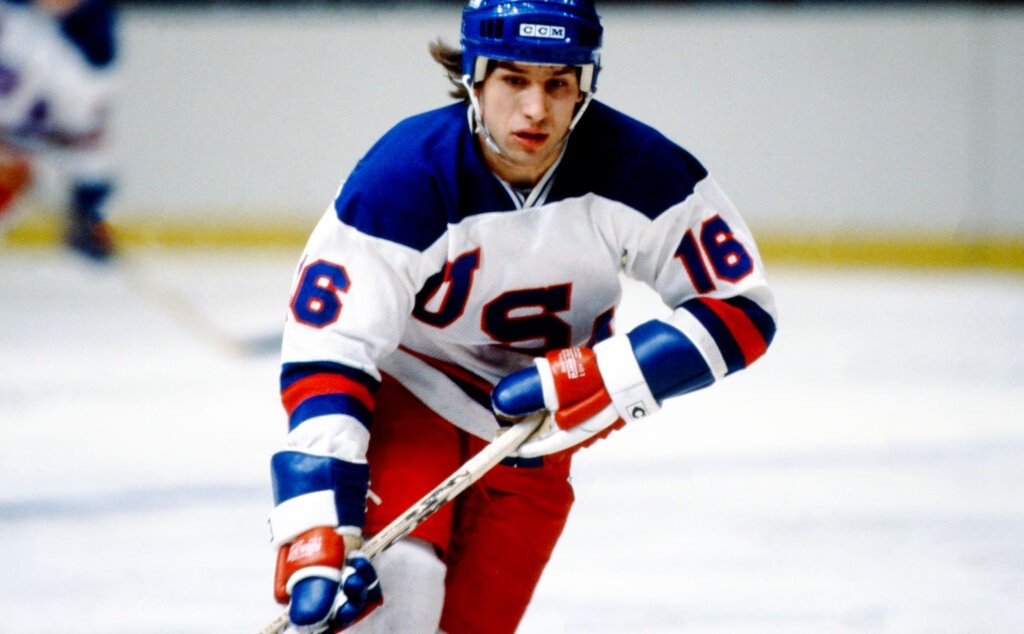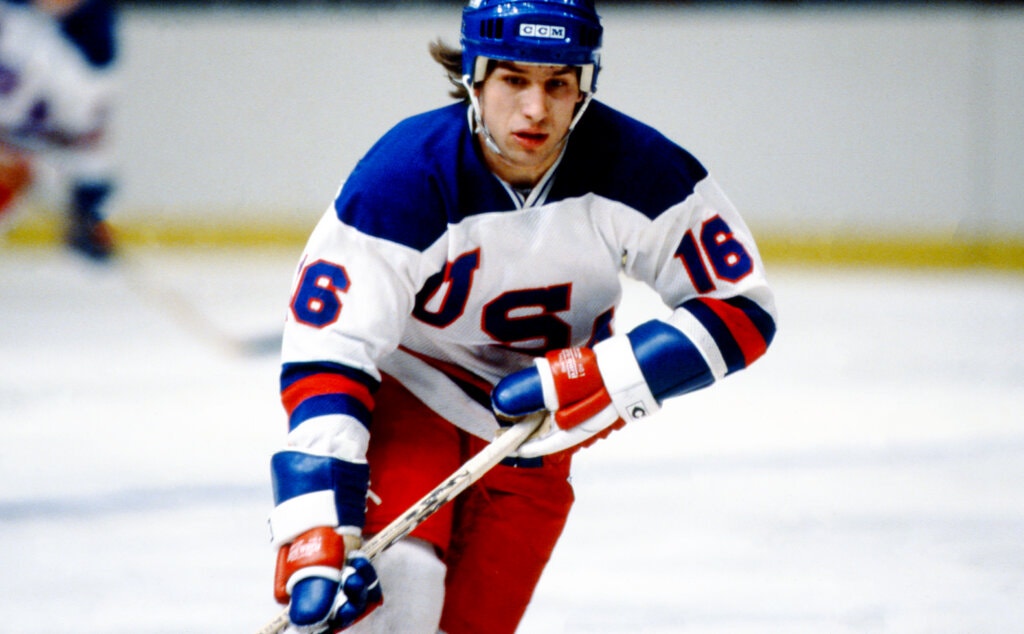
College Hockey Update: 1980 Olympian, Gold Medalist, former Minnesota-Duluth Bulldog, 1978-79 Western All-American, and former New York Ranger Mark Pavelich, died Thursday, March 4, 2021. You may already have heard this news. Sorry for my delay in posting this.
It is sad to think that any of the heroes from that Olympic team have already died. But in Mark Pavelich’s lifetime he notched an achievement on a scale that very few ever reach.
Mark Pavelich’s hockey path went from Eveleth High School, located in the rugged “iron range” of Minnesota, to the University of Minnesota at Duluth, to the 1980 Olympic gold medal hockey team, to the NHL.
63 is just too young to go and it’s amazing after all these years that he was only that old. But they were, after all, just a bunch of college kids when they did it — all, except for one or two, younger than me.
The death of Mark Pavelich is also sad for a couple of additional reasons. Pavelich apparently had some financial troubles years after the end of his stint in the NHL. In 2012, his 44-year-old wife, Kara, died in an accidental fall from a second-story balcony at their home. Two years later, Pavelich sold his gold medal for $263,00 through an auction house, saying he wanted to help his adult daughter. Later he developed significant mental problems including suffering from delusions and paranoia. Two psychologists found him to have post-traumatic stress disorder as well as other conditions. His family suspects that this was brought on by CTE as as result of repeated blows to the head while playing hockey. In August of 2019 Pavelich was charged with felony assault for striking a neighbor with a metal pipe, and badly injuring him. He was quickly ruled unfit to stand trial, mentally ill, and dangerous, by the judge in the criminal proceedings against him; he had become another person, someone very unlike the kind and gentle soul known so well by his family his entire life. Pavelich was found dead at the North Sauk Centre in Minnesota, a residential treatment center where he had been receiving care for mental illness after attacking his neighbor. His cause of death has not been determined. Just a lousy state of affairs.
“He seemed optimistic,” said Bill Baker, an Olympic teammate who spent an hour strolling the Healing Nest grounds with Pavelich in February, talking about pastimes they shared — hunting and fishing. “He seemed like he was wanting to put this behind him.”
“He seemed like Pav,” Baker added. “Pav was Pav.”
“Maybe it was a heart attack. We just don’t know at this point,” said Mike Eruzione, the captain of the 1980 team and the player who scored the winning goal against the Soviets, after Pavelich got him the puck.
In a message posted on Facebook, Pavelich’s sister, Jean Gevik, said her brother’s brain would be analyzed for signs of chronic traumatic encephalopathy, a degenerative brain disease believed to be caused by blows to the head. “I have no doubt it will be riddled with disease,” Gevik wrote. “This is an unbearable time for my family,” she wrote. “The news is absolutely devastating. The last flicker of Mark’s candle went out. Way too much trauma and way too much hurt. A life cut short.” Gevik wrote on Facebook, “Mark actually died years ago when he lost his beloved Kara.”
The news of Pavelich’s death angered at least one teammate who had tried to help him through his mental and legal difficulties — Barry Beck, a former Ranger. Since Pavelich was declared “mentally ill and dangerous” by a county court judge in 2019, Beck had used Facebook to provide updates on Pavelich’s condition, and to to call on the NHL to do more to help former players struggling with mental illness that might stem from head injuries.
“I’m deeply saddened, shocked and overcome with grief upon hearing the news of Mark Pavelich’s death,” Beck wrote on Facebook from Hong Kong, where he has coached hockey for more than a decade.
At 5 feet, 7 inches , Pavelich was the shortest player on the Olympic team. He spoke softly, when at all, and avoided the spotlight. The Minnesota native was described by one teammate as a “hockey genius.”
“He’s like an artist, painting a picture going down the ice,” Buzz Schneider, a fellow member of the “Iron Rangers” or “Coneheads” line with Pavelich and John Harrington, said in 2015 while waving his hand with a whoosh. “He could see different things, dish that puck off and go across the grain.”
“He was a genius, how quickly he could think the game,” Harrington said.
Pavelich played a major role in the 1980 Olympics. Against the Soviets, Pavelich sent the puck to Schneider on the left wing, and his slapshot tied the game, 1-1. In the third period, with the game tied at 3-3, Pavelich tipped the puck from the boards to the middle of the Soviet zone just as Eruzione was crossing the blueline. Eruzione’s wrist shot put the U.S. team, made up primarily of college players, ahead of the Soviets, a team of mostly professionals. Two days later, the United States defeated Finland to win the gold medal.
He was at ease around hockey, but the spotlight off the ice cast an unwanted glare. When Eruzione was doing color commentary on Ranger broadcasts, Pavelich declined even his requests for interviews. “Finally, the network offered $1,000 in hunting and fishing equipment, and Mark said, ‘OK, I’ll do it,’” Eruzione recalled.
When Sports Illustrated in 1999 named the “Miracle on Ice” the greatest sports moment of the 20th century at a gala at Madison Square Garden, Pavelich stayed home in Minnesota. “It’s too glitzy for me, Rizzo,” Eruzione recalled him saying. In 2002, the 1980 team was chosen to light the torch at the 2002 Winter Olympics in Salt Lake City. Again, Pavelich stayed home.
After the Olympics Pavelich “became a centerpiece” for the New York Rangers for five seasons, scoring 133 goals with 185 assists in 341 games. Pavelich’s 76 points in 1981-82 is the franchise’s rookie record. He had a five-goal game for the Rangers on Feb. 23, 1983, in an 11-3 victory against the Hartford Whalers. He is the only American to have scored five goals in an NHL game.
On March 4, Schneider got a call from a friend who had heard a rumor that Pavelich had died. He called Baker, and they pieced together the sad news. Schneider recalled visiting last fall, and being struck by the contrast between the Pavelich he read about in the newspaper and the quiet man he saw at the fantasy camp and other Olympic team gatherings.
“He felt safe around us, you know,” Schneider said. “It was a family.”
“As a kid growing up in Hibbing I used to go to the arena and hang out with gear in hand waiting to see if I could skate with the teams that rented the ice,” former Minnesota and NHL player Pat Micheletti tweeted. “Mark Pavelich always let me join with the Eveleth guys. He taught me so much about the game.”
“The New York Rangers are saddened to learn of the passing of Mark Pavelich. His determination, passion, and dazzling playmaking ability earned him the adoration of Rangers fans during his five-year tenure in New York,” the Rangers said in a statement. “Mark helped inspire a nation through the integral role he played on the ‘Miracle on Ice’ team in the 1980 Winter Olympics. Our thoughts are with Mark’s loved ones during this difficult time.”
“We are saddened to hear about the passing of 1980 Olympic gold medalist Mark Pavelich,” USA Hockey said in a statement. “We extend our deepest condolences to Mark’s family & friends. (He is) forever a part of hockey history.”
Mark Pavelich is the second player from the 1980 Olympic Team to die. He was preceded by Wisconsin Badger Bob Suter, who died from a heart attack in September of 2014. The Olympic Team Coach, Herb Brooks, died in an auto accident in August of 2003. It is not an understatement to say that this team’s accomplishment captivated the entire country. It was a true team that Brooks built, nearly defining what the word team means; it would not have been the same team without any one of the players who were on it, and I’ll never forget the fantastic joy and excitement that they created for me as a fan, and as a spectator/viewer.
Thanks to John McLean for alerting me to this sad news the day he was found dead. My own delay in writing this remembrance.
— Tom

Leave a Reply
You must be logged in to post a comment.